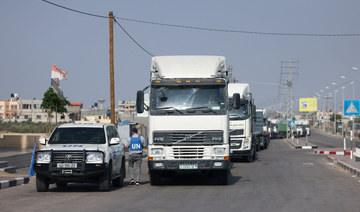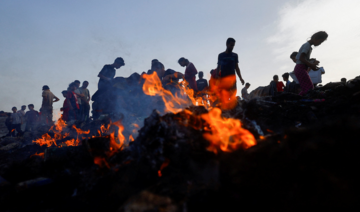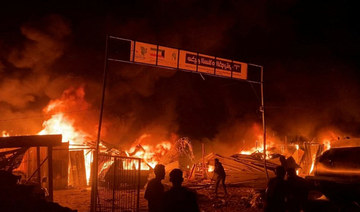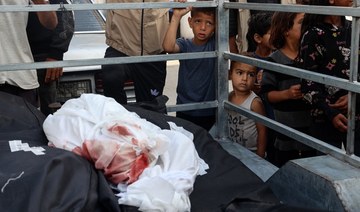BEIJING: A Chinese navy task force has wrapped up visits to four Arabian Gulf states as the increasingly capable maritime force grows its presence in the strategically vital region.
The three ships departed from Kuwait on Sunday after stopping in Saudi Arabia, Qatar and the UAE, the Defense Ministry said on its website Monday. They had previously completed an assignment escorting commercial shipping and patrolling for pirates in the Gulf of Aden, the 24th Chinese task force to be dispatched for such duties since China joined the multinational effort in December 2008.
China’s navy has used the patrols to build its capacity to operate far from home ports and expand its use of the military as a tool of diplomacy following the model of other major nations. In its report, the ministry said the visits aimed to stir interest in China’s project to link European and Asian economies along the ancient Silk Road land and sea routes.
In addition, the deployments have prompted Beijing to build a logistics and support center in Djibouti that is widely considered to be China’s first overseas military base.
The Horn of Africa nation already hosts US, French and Japanese bases for logistical support and to facilitate African military operations. Japan, China’s longtime Asian rival, is now seeking to expand its Djibouti facility as a counterweight to China’s presence, Japanese media report.
The patrols have also given China ready access to the Mediterranean, and, in 2011, it took the unprecedented step of sending one of its most sophisticated warships together with military transport aircraft to help in the evacuation of about 35,000 Chinese citizens from Libya.
In 2015, China detached three navy ships from the anti-piracy patrols to rescue Chinese citizens and other foreign nationals from fighting in Yemen. The same year, it took part in its first Mediterranean joint naval exercises with Russia.
Chinese navy wraps up visits to Gulf states
Chinese navy wraps up visits to Gulf states

Iran’s near-bomb-grade uranium stock grows, talks stall, IAEA reports say

- Grossi traveled to Iran this month for talks with Iranian officials aimed at improving cooperation and IAEA monitoring in Iran
- Follow-up talks have stalled, however, after the death of Iranian President Raisi in a helicopter crash last week
VIENNA: Iran is enriching uranium to close to weapons-grade at a steady pace while discussions aimed at improving its cooperation with the UN nuclear watchdog are stalled, two confidential reports by the watchdog showed on Monday.
The International Atomic Energy Agency faces a range of difficulties in Iran, including the fact it only implemented a small fraction of the steps IAEA chief Rafael Grossi thought it committed to in a “Joint Statement” on cooperation last year.
“There has been no progress in the past year toward implementing the Joint Statement of 4 March 2023,” one of the two reports to member states, both of which were seen by Reuters, said.
Grossi traveled to Iran this month for talks with Iranian officials aimed at improving cooperation and IAEA monitoring in Iran. Follow-up talks have stalled, however, after the death of Iranian President Ebrahim Raisi in a helicopter crash last week.
“The Director General reiterates to the new government of Iran his call for, and disposition to continue with, the high-level dialogue and ensuing technical exchanges commenced ... on 6-7 May 2024,” the report added.
It is 18 months since the IAEA’s 35-nation Board of Governors last passed a resolution against Iran, ordering it to cooperate urgently with a years-long IAEA investigation into uranium particles found at three undeclared sites.
While the number of sites has since been reduced to two, Iran has still not explained how the traces got there.
“The Director General regrets that the outstanding safeguards issues have not been resolved,” the report said, referring to those traces.
France and Britain are pushing for a new resolution at next week’s Board meeting, which the United States has so far not supported, diplomats say. Iran usually bristles at such resolutions, taking nuclear-related steps in response.
The other report said Iran’s stock of uranium enriched to up to 60 percent purity, close to the roughly 90 percent of weapons-grade, grew by 20.6 kg over the quarter to 142.1 kg as of May 11, and Iran later diluted 5.9 kg to a lower enrichment level.
That means Iran now has roughly enough material enriched to up to 60 percent purity, if enriched further, for three nuclear weapons in theory, according to an IAEA yardstick. It has enough for more at lower enrichment levels.
Western powers say there is no credible civil reason for Iran to enrich to that level. Iran says its aims are peaceful.
Israeli attack on Rafah a ‘catastrophe,’ Egypt FM tells Brussels

- Discussions between Shoukry and Borrell focused on the humanitarian, security, and political aspects of the crisis in the Gaza Strip
CAIRO: Foreign Minister Sameh Shoukry has restated Egypt’s warning about the risks of Israeli military operations in the Palestinian city of Rafah.
He emphasized the potentially catastrophic humanitarian impact on over 1.4 million Palestinians, as well as the security implications for regional peace and stability.
Shoukry made the remarks during his meeting in Brussels with Josep Borrell, the high representative of the EU for foreign affairs and security policy.
He also met with the British Minister of State for the Middle East and North Africa, Lord (Tariq) Ahmad of Wimbledon.
The talks took place on the sidelines of the Brussels EU Foreign Affairs Council meeting.
Discussions between Shoukry and Borrell focused on the humanitarian, security, and political aspects of the crisis in the Gaza Strip.
Shoukry highlighted the important role of international parties, such as the EU, in supporting efforts to halt the conflict in Gaza.
During the meeting, the two sides affirmed the necessity of reaching a ceasefire in the Gaza Strip and halting military operations in Rafah, as well as ensuring full and safe access to humanitarian aid to meet the urgent needs of people in Gaza.
The meeting highlighted the importance of Israel respecting and protecting relief workers, as well as ensuring access and freedom of movement for relief crews in line with international humanitarian law.
Shoukry called for Israel to remove all obstacles to aid access, and open all land crossings between Israel and the Gaza Strip.
He restated Egypt’s opposition to Israeli control of all crossings in the Gaza Strip, saying this is being used to tighten the siege and deprive people in Gaza of essential supplies.
Egypt also rejects any attempts to displace Palestinians from their territories or eliminate the Palestinian cause, he said.
Shoukry and Borrell explored the Arab vision and paths of action with the EU to end the conflict by advancing the political path to support the implementation of the two-state solution.
Both sides stressed the need for international legitimacy resolutions to support the establishment of an independent Palestinian state that can live in peace side by side with Israel.
Separately, Egyptian and British officials exchanged views and assessments regarding the humanitarian and security conditions in the Gaza Strip.
They stressed the necessity of reaching a ceasefire in the Strip, swapping hostages and detainees, and ensuring the protection of Palestinian civilians, as well as the inevitability of ensuring humanitarian aid access to the population.
Shoukry and the British minister affirmed the importance of supporting the path of a political solution based on the two-state solution to address the roots of the crisis.
The two sides agreed to continue consultation and coordination to curb the humanitarian crisis in the Gaza Strip and explore means to provide the necessary support to the Palestinian Authority and prevent the deterioration of the situation in the West Bank.
Egypt military says guard killed in ‘shooting’ at Rafah border

- The Israeli military reported a “shooting incident” on the Egyptian border, and said it was discussing the incident with Egypt
CAIRO: Egypt’s military said Monday a border guard was killed in a shooting in the Rafah border area with Gaza, where Israeli forces are deployed, adding that a probe had been launched.
“The Egyptian armed forces, through the competent authorities, are investigating a shooting incident in the Rafah border area which led to the martyrdom of a guard,” a military statement said.
The Israeli military reported a “shooting incident” on the Egyptian border, and said it was discussing the incident with Egypt.
Since May 7 Israeli forces have been operating in Rafah, a city in the far south of the Gaza Strip bordering Egypt.
Since the war in Gaza between Israel and Hamas broke out on October 7, Egypt has been keen both to remain in solidarity with the Palestinians and retain its ties with Israel.
Egypt was in 1979 the first Arab country to sign a peace treaty with Egypt.
Cairo fears domestic repercussions over the war, and tensions have soared since Israeli forces seized the Rafah border crossing, a key entry point for humanitarian aid.
A day after the war began in October, a policeman in Egypt’s second city Alexandria opened fire on an Israeli tour group, killing two Israeli tourists and their Egyptian guide.
In a previous shooting, in June 2023, Israel said an Egyptian policeman crossed the border and killed three Israeli soldiers before being himself shot dead.
The Egyptian army said at the time the three Israelis were killed in a firefight by a member of the Egyptian security forces who had crossed the border “in pursuit of drug traffickers.”
Gaza hospitals operating in ‘medieval’ conditions: UK doctor
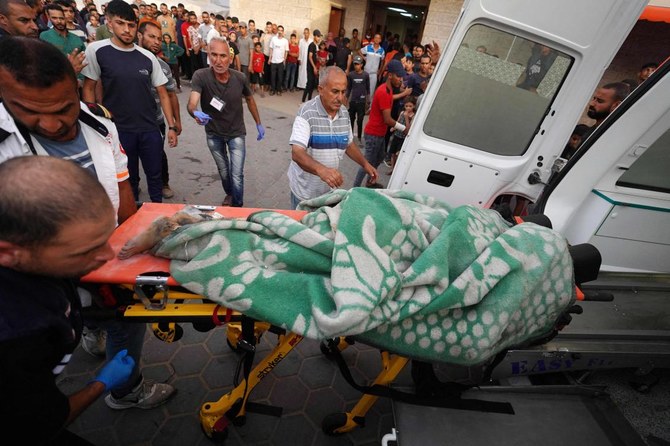
- Dawas described dire conditions in Gaza, with medical staff operating virtually without supplies, power supplies intermittent and patients lying on the floor
BRUSSELS: Gaza hospitals are reduced to practicing “medieval medicine,” a British surgeon recently returned from the bombarded Palestinian territory said on Monday.
“It’s absolutely true to describe it as medieval medicine. It is what you would hear about or read about what would be happening in Europe maybe 300, 400 years ago,” Dr. Khaled Dawas, head of gastrointestinal surgery at University College London Hospitals, told AFP in an interview.
Dawas described dire conditions in Gaza, with medical staff operating virtually without supplies, power supplies intermittent and patients lying on the floor.
He returned at the end of April from his two-week stint to help overstretched Palestinian hospital surgeons — his second wartime stay there, following one in January.
“By April they were seeing this constant, constant volume of dying and dead bodies coming into the hospitals and any human wouldn’t be able to tolerate it,” he said.
“They carry on working, but you can see the effect of that. They’re all extremely burdened by what they’re doing.”
The 54-year-old surgeon, an Arabic-speaker who has Palestinian parents, said many people in Gaza wounded or needing other medical attention tried to avoid going to the hospitals because it “means pretty much a death sentence.”
That was “because of the wound infections, because of the conditions.”
While the doctor said he felt “guilt” about leaving Gaza to return to his regular British medical work, from which he had taken leave, he said he would be back.
“I do hope that when I go back next time, that it’ll be when the ceasefire is in place. Because watching it unfold when you’re there is unbearable,” he said.
“It becomes more unbearable when you leave, actually, when you think back on what you’ve seen and what you’ve heard. And you wonder how people, any human being, can survive this for so long.”
Dawas was in Brussels to describe his experience to European Union officials.
Gaza has been under Israeli bombardment and ground assault since October 7, when Hamas militants attacked southern Israel, killing more than 1,170 people, mostly civilians, according to an AFP tally based on Israeli figures.
Israel’s retaliatory offensive has killed at 36,050 people in Gaza, mostly civilians, according to the Hamas-run territory’s health ministry.
EU-Israel relations take a nosedive as Spain, Ireland set to formally recognize a Palestinian state
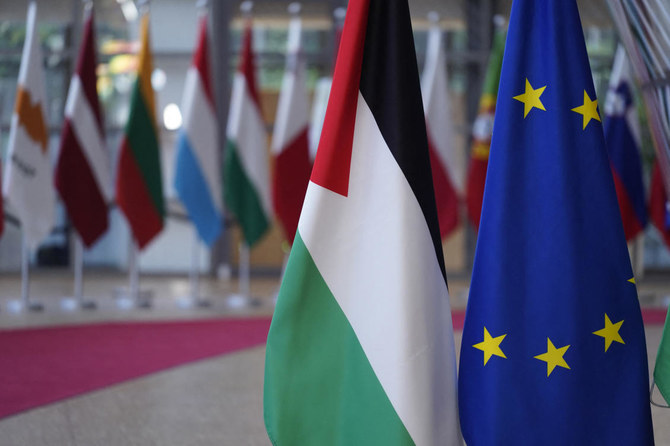
- EU’s foreign policy chief Josep Borrell threw his full weight to support the International Criminal Court
BRUSSELS: Relations between the European Union and Israel took a nosedive on the eve of the diplomatic recognition of a Palestinian state by EU members Ireland and Spain, with Madrid suggesting sanctions should be considered against Israel for its continued attacks in the southern Gaza city of Rafah.
Israeli Foreign Minister Katz told Spain that its consulate in Jerusalem will not be allowed to help Palestinians.
At the same time, the EU’s foreign policy chief Josep Borrell, a Spaniard, threw his full weight to support the International Criminal Court, whose prosecutor is seeking an arrest warrant against Prime Minister Benjamin Netanyahu and others, including the leaders of Hamas.
“The prosecutor of the court has been strongly intimidated and accused of antisemitism,” Borrell said. “The word antisemitic, it’s too heavy. It’s too important.”
Angry words abounded Monday, with Katz accusing Spain of “rewarding terror” by recognizing a Palestinian state, and saying that “the days of the Inquisition are over.” He referred to the infamous Spanish institution started in the 15th century to maintain Roman Catholic orthodoxy that forced Jews and Muslims to flee, convert to Catholicism or, in some instances, face death.
“No one will force us to convert our religion or threaten our existence — those who harm us, we will harm in return,” said Katz.
Even though the EU and its member nations have been steadfast in condemning the Oct. 7 Hamas-led attack in which militants stormed across the Gaza border into Israel, killing 1,200 people and taking some 250 hostage, the bloc has been equally critical of Israel’s ensuing offensive that has killed more than 35,000 Palestinians, according to Gaza’s Health Ministry.
The latest attacks have centered on Rafah, where Palestinian health workers said Israeli airstrikes killed at least 35 people Sunday, hit tents for displaced people and left “numerous” others trapped in flaming debris.
The UN’s top court, the International Court of Justice, on Friday demanded that Israel immediately halt its offensive on Rafah, even if it stopped short of ordering a ceasefire for the Gaza enclave.
“Israel has to stop its offensive in Rafah,” Spanish Foreign Minister José Manuel Albares said.
Spain, Ireland and non-EU member Norway plan to make official their recognition of a Palestinian state on Tuesday. Their joint announcement last week triggered an angry response from Israeli authorities, which summoned the countries’ ambassadors in Tel Aviv to the Israeli Foreign Ministry.
Albares criticized the treatment of the ambassadors. “We reject something that is not within diplomatic courtesy and the customs of the Vienna Convention on Diplomatic Relations,” he said.
“But at the same time we have also agreed that we are not going to fall into any provocation that distances us from our goal,” he added. “Our aim is to recognize the state of Palestine tomorrow, make all possible efforts to achieve a permanent ceasefire as soon as possible and also, in the end, to achieve that definitive peace.”





